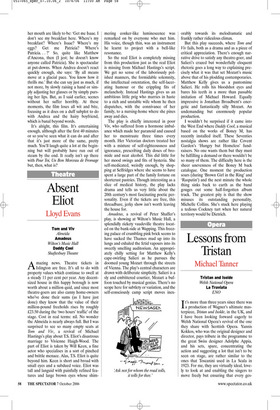Absent Eliot
Lloyd Evans
Tom and Viv Almeida Amadeus Wilton’s Music Hall Daddy Cool Shaftesbury Theatre Amazing news. Theatre tickets in Islington are free. It’s all to do with property values which continue to swell at a steady 11 per cent per year. Any decentsized house in this happy borough is now worth about a million quid, and since most theatre-goers are also canny home-owners who’ve done their sums (as I have just done) they know that the value of their million-pound freeholds rises by roughly £23.50 during the ‘two hours’ traffic’ of the stage. Cost in real terms: nil. No wonder the Almeida is nearly always full. But I was surprised to see so many empty seats at Tom and Viv, a revival of Michael Hastings’s play about T.S. Eliot’s disastrous marriage to Vivienne Haigh-Wood. The part of Eliot is taken by Will Keen, a fine actor who specialises in a sort of pinched and brittle menace. Alas, T.S. Eliot is quite beyond him. Keen is short and broad with small eyes and a subdued voice. Eliot was tall and languid with painfully refined features and large brown eyes whose shim mering conker-like luminescence was remarked on by everyone who met him. His voice, though thin, was an instrument he learnt to project with a bell-like resonance.
So the real Eliot is completely missing from this production just as the real Eliot is missing from Michael Hastings’s script. We get no sense of the laboriously polished manners, the formidable solemnity, the intellectual ostentation, the self-lacerating humour or the crippling fits of melancholy. Instead Hastings gives us an ambitious little prig who marries in haste to a rich and unstable wife whom he then dispatches, with the connivance of her family, to a nursing-home where she pines away and dies.
The play is chiefly interested in poor Viv, who suffered from a hormone imbalance which made her paranoid and caused her to menstruate three times every month. Her Victorian doctors treated her with a mixture of self-righteousness and ignorance, prescribing daily doses of bromide and neat alcohol. This did little for her mood swings and fits of hysteria. She self-medicated, weirdly enough, by shopping at Selfridges where she seems to have spent a large part of the family fortune on shortcrust pastries. Though interesting as a slice of medical history, the play lacks drama and tells us very little about the 20th century’s most fascinating poetic personality. Even if the tickets are free, this threadbare, jerky show isn’t worth leaving the house for.
Amadeus, a revival of Peter Shaffer’s play, is showing at Wilton’s Music Hall, a splendidly rickety vaudeville theatre located on the bank-side at Wapping. This freezing palace of crumbling pink brick seems to have sucked the Thames mud up into its lungs and exhaled the fetid vapours into its sweetly smelling auditorium. An appropriately chilly setting for Matthew Kelly’s cape-swirling Salieri as he pursues the doomed young Mozart through the streets of Vienna. The play’s central characters are drawn with deliberate simplicity. Salieri is a sly and embittered courtier, Mozart a buffoon touched by musical genius. There’s no scope here for subtlety or variation, and the self-consciously camp script moves inex orably towards its melodramatic and frankly rather ridiculous climax.
But this play succeeds, where Tom and Viv fails, both as a drama and as a piece of critical appreciation. There’s enough narrative drive to satisfy any theatre-goer, and Salieri’s crazed but wonderfully eloquent rhetoric goes a long way to explaining precisely what it was that set Mozart’s music above that of his plodding contemporaries. Matthew Kelly gives us a pantomime Salieri. He rolls his bloodshot eyes and bares his teeth in a more than passable imitation of Michael Howard. Equally impressive is Jonathan Broadbent’s energetic and fantastically silly Mozart. An undemanding but enormously popular production.
I wouldn’t be surprised if it came into the West End where Daddy Cool, a musical based on the works of Boney M, has recently installed itself. These Seventies nostalgia shows are rather like Covent Garden’s ‘Hungry but Homeless’ fundraisers. No one wants them but they must be fulfilling a demand or there wouldn’t be so many of them. The difficulty here is the sheer unevenness of the Boney M back catalogue. One moment the production soars (during ‘Brown Girl in the Ring’ and ‘Rasputin’) and the next minute the whole thing sinks back to earth as the band gouges out some half-forgotten album track. The greatest pity is that the show misuses its outstanding personality, Michelle Collins. She’s stuck here playing a tedious Cockney tart when her natural territory would be Dietrich.


















































































 Previous page
Previous page